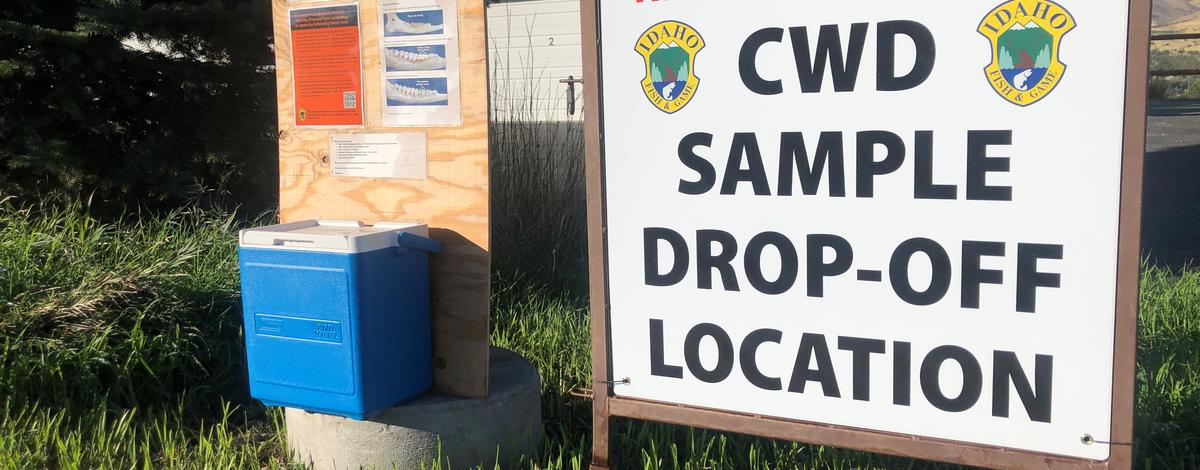Chronic Wasting Disease or CWD was detected for the first time in Idaho in 2021 in Game Management Units 14 and 15 after more than 20 years of proactive surveillance and testing. CWD is a contagious and fatal neurological disease that affects deer, elk, and moose. There is no cure for this fatal disease.
As a result of last year’s detection and as part of Fish and Game’s annual surveillance program, biologists in the Southeast Region will again be collecting samples from harvested deer, elk, and moose. Testing cannot be done using meat from the harvested animal.
CWD Testing
Hunters who harvest a deer or elk in Game Management Units 70, 71, 72, 73, 73A, 74, 75, 76, 77, or 78 are encouraged to have their animal tested for CWD.
Hunters can bring the head of their harvested animal with lower portion of the neck intact to a check station or the regional Fish and Game office in Pocatello (during normal business hours) where staff can collect samples.
Hunters wishing to extract lymph nodes themselves for testing may request a CWD test sampling kit to be mailed to them. Allow at least one week for delivery. Hunters can also pick up a sampling kit at a Fish and Game regional office. Kits and the testing are free.
Lymph node removal instructions and how-to-videos can be found on the Fish and Game website at https://idfg.idaho.gov/cwd/sampling/how-to.
There are 5 designated drop-off sites with clearly marked containers for lymph node collection only in the Southeast Region:
- Soda Springs Idaho Transportation Department (ITD) shed.
- Preston ITD shed
- Montpelier ITD shed
- Rockland – Highway 37
- Regional Fish and Game office parking lot in Pocatello
Access to these drop-off sites is 24 hours a day/7 days a week. It can take up to six weeks to get test results back, and the test results can be found online. Please remember to completely fill out sampling kit label to ensure samples are tested and results reported accurately.
What if a harvested animal tests positive for CWD?
According to the U.S. Center for Disease Control (CDC), there has been no reported cases of CWD infecting people. However, CDC recommends that people do not eat meat from an animal that tests positive for CWD.
Hunting in Units 14 and 15 this fall? Here is what hunters should know.
CWD positive deer and elk were detected in Units 14 and 15 in 2021, both of which are located south of Grangeville in northern Idaho. These two units are now grouped into a designated CWD Management Zone, which means all hunters who harvest a deer, elk or moose in this zone are required to have their animals tested for CWD.
Carcasses or any part of a deer, elk, or moose harvested in Units 14 or 15 may not be transported out of those units except quarters or deboned meat that does not include brain or spinal tissue, and edible organs that do not include brains. To see other exceptions, go to CWD rules webpage.
Other rules to reduce risk of CWD spread in Idaho
Prior to the detection of CWD in Units 14 and 15, Idaho Fish and Game had already implemented a set of rules to reduce risk of CWD spread in Idaho, and those original rules are still in effect.
Idaho bans the use of natural cervid urine for big game hunting, which includes urine from deer, elk, moose, and caribou (reindeer).
Hunters should also remember it is unlawful to import, transport or possess carcasses or any part of a deer, elk, moose or caribou from a CWD-positive state or territory.
Some of the exceptions to the transport rule include:
- Meat that is cut and wrapped
- Quarters or deboned meat that does not include brain or spinal tissue
- Edible organs that do not include brains
- Hides without heads
- Cleaned and dried skulls or skull caps
To see all CWD-related rules, go to the CWD rules webpage on Idaho Fish and Game’s website.
For more information about the CWD sampling program in the Southeast Region, contact the regional office in Pocatello at (208) 232-4703.

